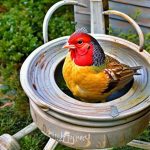Keeping chickens has gained popularity in the UK as more individuals opt to raise their own flocks for fresh eggs, companionship, and pest control. This practice is feasible in both rural and urban settings, offering a rewarding experience for chicken keepers. Chickens provide a sustainable source of eggs, serve as pets, and help reduce food waste by consuming kitchen scraps.
They also act as natural pest controllers by foraging for insects and other garden pests. The recent surge in interest in sustainable living and self-sufficiency has contributed to the growing trend of keeping chickens. With proper knowledge and resources, individuals can successfully maintain a chicken coop in their backyard or garden.
However, it is crucial to understand the legal requirements, regulations, costs, and necessary care associated with keeping chickens. This article will delve into various aspects of keeping chickens in the UK, including legal requirements, expenses, housing and space needs, care and maintenance, potential challenges, and the numerous benefits of chicken ownership. By exploring these topics, readers will gain a comprehensive understanding of what it takes to keep chickens and the advantages of doing so.
Table of Contents
- 1 Legal Requirements and Regulations for Keeping Chickens
- 2 The Cost of Keeping Chickens in the UK
- 3 Housing and Space Requirements for Chickens
- 4 Care and Maintenance of Chickens
- 5 Potential Challenges and Obstacles in Keeping Chickens
- 6 Benefits of Keeping Chickens in the UK
- 7 FAQs
- 7.1 What are the basic requirements for keeping chickens in the UK?
- 7.2 How much time and effort is required to care for chickens in the UK?
- 7.3 What are the legal requirements for keeping chickens in the UK?
- 7.4 What are the common challenges of keeping chickens in the UK?
- 7.5 Are there any specific health concerns for chickens in the UK?
- 7.6 What are the benefits of keeping chickens in the UK?
Key Takeaways
- Keeping chickens in the UK is a popular and rewarding hobby for many people.
- There are legal requirements and regulations in place for keeping chickens, including registration and biosecurity measures.
- The cost of keeping chickens in the UK includes initial setup, ongoing feed and healthcare expenses.
- Housing and space requirements for chickens are important for their health and well-being.
- Care and maintenance of chickens involves providing proper nutrition, healthcare, and regular cleaning of their living space.
Legal Requirements and Regulations for Keeping Chickens
Welfare of the Birds
In the UK, there are certain legal requirements and regulations that must be followed when keeping chickens. These regulations are in place to ensure the welfare of the birds and to prevent the spread of diseases. One of the most important legal requirements is that chickens must be kept in a suitable environment that meets their welfare needs. This includes providing adequate space, shelter, food, water, and protection from predators.
Registration and Disease Prevention
Another important legal requirement is that chickens must be registered with the Department for Environment, Food & Rural Affairs (DEFRA). This is to ensure that the government can trace the movement of poultry in the event of a disease outbreak. Additionally, chickens must be kept in a clean and hygienic environment to prevent the spread of diseases.
Urban Area Regulations
It’s also important to note that there are specific rules and regulations for keeping chickens in urban areas, so it’s essential to check with your local council before getting chickens. For example, some councils may have restrictions on the number of chickens you can keep or may require a permit for keeping poultry.
Responsible Chicken Keeping
By understanding and following these legal requirements and regulations, you can ensure that you are keeping your chickens in a responsible and lawful manner.
The Cost of Keeping Chickens in the UK

The cost of keeping chickens in the UK can vary depending on several factors, including the initial setup, ongoing expenses, and any unexpected costs that may arise. The initial setup costs typically include purchasing or building a coop, purchasing chickens, feeders, waterers, bedding, and other necessary supplies. The cost of a coop can range from a few hundred pounds for a basic DIY coop to over a thousand pounds for a high-quality pre-built coop.
Additionally, the cost of purchasing chickens can vary depending on the breed and age of the birds. Ongoing expenses for keeping chickens include feed, bedding, healthcare supplies, and any necessary repairs or maintenance for the coop and run. The cost of feed can add up over time, especially if you have a large flock or if you choose to feed your chickens organic or specialty feeds.
Bedding is another ongoing expense, as it needs to be replaced regularly to keep the coop clean and hygienic. Additionally, it’s important to budget for healthcare supplies such as worming treatments, vitamins, and first aid supplies. Finally, it’s important to have a contingency fund for any unexpected costs that may arise, such as veterinary bills or repairs to the coop or run.
Housing and Space Requirements for Chickens
When it comes to housing and space requirements for chickens, it’s important to provide a safe and comfortable environment that meets their welfare needs. The size of the coop and run will depend on the number of chickens you plan to keep, as well as the breed and size of the birds. As a general rule of thumb, each chicken should have at least 1-2 square feet of space inside the coop and 8-10 square feet of space in the outdoor run.
This will allow them to move around freely, stretch their wings, and engage in natural behaviors such as scratching and dust bathing. The coop should also provide protection from predators and the elements, with secure doors and windows to keep out foxes, rats, and other potential threats. Additionally, the coop should be well-ventilated to prevent moisture buildup and ammonia levels from rising.
It’s also important to provide perches and nesting boxes inside the coop to give the chickens a place to roost at night and lay their eggs. The outdoor run should be securely fenced to prevent escape and should provide access to fresh grass, sunlight, and areas for dust bathing. By providing a suitable housing environment that meets their space requirements, you can ensure that your chickens are happy, healthy, and safe.
Care and Maintenance of Chickens
Caring for chickens involves daily tasks such as feeding, watering, collecting eggs, cleaning the coop, and monitoring the health of the birds. It’s important to provide a balanced diet for your chickens that includes a good quality layer feed as well as access to fresh water at all times. Additionally, it’s important to provide grit and oyster shell for calcium supplementation and access to fresh greens or kitchen scraps for added nutrition.
Regularly cleaning the coop is essential for maintaining a healthy environment for your chickens. This includes removing soiled bedding, replacing it with fresh bedding, and regularly disinfecting surfaces to prevent the buildup of bacteria. Monitoring the health of your chickens is also an important part of care and maintenance.
This includes observing their behavior, checking for any signs of illness or injury, and providing regular healthcare treatments such as worming and vaccinations. It’s also important to regularly inspect the coop and run for any signs of wear or damage that may need repair or maintenance. By providing proper care and maintenance for your chickens, you can ensure that they are healthy, happy, and thriving.
Potential Challenges and Obstacles in Keeping Chickens

Predator Protection
One common challenge is dealing with predators such as foxes, rats, birds of prey, or even neighborhood dogs. To prevent attacks, it’s crucial to take measures to predator-proof your coop and run by using secure fencing, locks on doors and windows, and even installing motion-activated lights or alarms.
Managing Waste and Odors
Another potential challenge is managing the smell and waste from chicken droppings. Regularly cleaning the coop and using absorbent bedding can help minimize odors and keep the coop clean.
Health and Integration Challenges
Other potential obstacles include dealing with health issues such as parasites or diseases that can affect your flock, and integrating new chickens into an existing flock, which can be challenging due to pecking order dynamics. Regularly monitoring the health of your chickens and providing proper healthcare treatments can help prevent health issues from arising. Providing plenty of space, multiple feeding stations, and supervision during introductions can help minimize conflicts between birds.
By being aware of these potential challenges and obstacles, you can take proactive measures to address them and ensure a positive experience in keeping chickens.
Benefits of Keeping Chickens in the UK
There are numerous benefits to keeping chickens in the UK, both for individuals and for the community as a whole. One of the most obvious benefits is having a sustainable source of fresh eggs right in your own backyard. Fresh eggs from your own flock are not only delicious but also nutritious and free from harmful chemicals or antibiotics often found in store-bought eggs.
Additionally, keeping chickens can be a great educational experience for children and adults alike, teaching valuable lessons about responsibility, animal care, and where food comes from. Chickens also provide natural pest control by foraging for insects in the garden, reducing the need for chemical pesticides. They also produce high-quality fertilizer through their droppings which can be used to enrich garden soil.
Furthermore, chickens make great pets with their unique personalities and social behaviors. They can provide companionship and entertainment while also helping reduce stress levels through their calming presence. Overall, keeping chickens can contribute to a more sustainable lifestyle by reducing food waste through composting kitchen scraps and providing a local source of fresh eggs.
By understanding these benefits, more people may be encouraged to consider keeping chickens as part of their sustainable living practices in the UK.
If you’re considering keeping chickens in the UK, you may also be interested in learning about the ideal chicken coop door size. Poultry Wizard offers a helpful article on chicken coop door size to ensure your feathered friends have a comfortable and secure living space.
FAQs
What are the basic requirements for keeping chickens in the UK?
In the UK, basic requirements for keeping chickens include a suitable coop or housing, access to a secure outdoor area, food and water, and regular health checks.
How much time and effort is required to care for chickens in the UK?
Caring for chickens in the UK requires daily feeding and watering, regular cleaning of the coop, and monitoring for signs of illness or distress. This typically requires a moderate amount of time and effort.
What are the legal requirements for keeping chickens in the UK?
In the UK, there are legal requirements for keeping chickens, including registering your flock with the Department for Environment, Food & Rural Affairs (DEFRA) and following regulations for biosecurity and disease control.
What are the common challenges of keeping chickens in the UK?
Common challenges of keeping chickens in the UK include predator protection, maintaining good hygiene to prevent disease, and providing suitable shelter and space for the chickens to roam.
Are there any specific health concerns for chickens in the UK?
Chickens in the UK can be susceptible to various health issues such as parasites, respiratory infections, and egg-laying problems. It’s important to monitor their health and seek veterinary care when necessary.
What are the benefits of keeping chickens in the UK?
Keeping chickens in the UK can provide a sustainable source of fresh eggs, natural pest control in the garden, and the enjoyment of caring for and observing these unique animals.
Meet Walter, the feathered-friend fanatic of Florida! Nestled in the sunshine state, Walter struts through life with his feathered companions, clucking his way to happiness. With a coop that’s fancier than a five-star hotel, he’s the Don Juan of the chicken world. When he’s not teaching his hens to do the cha-cha, you’ll find him in a heated debate with his prized rooster, Sir Clucks-a-Lot. Walter’s poultry passion is no yolk; he’s the sunny-side-up guy you never knew you needed in your flock of friends!







